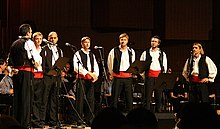Klapa
Klapa are urban folk music groups that perform polyphonic chants on special occasions in the historical region of Dalmatia in southern Croatia , usually unaccompanied.
Klapa means "group". The roots of the musical style can be found in liturgical church chant. The subjects covered are love, wine and harvest, the homeland and the sea. The music lives from the harmonies and melodies , the rhythm is only of secondary importance.
Originally there were pure male formations of up to 12 singers who can create a special atmosphere with their voices. Today there is also all-women Klapa and, although rarely, mixed Klapa. Each member of the group has a different pitch, which results in a very closed tone structure. A traditional group consists of a first tenor , a second tenor who accompanies the melody in thirds , a baritone and a bass , with all voices except the first tenor being split. Occasionally a restrained instrument such as guitar or tamburica , a kind of mandolin , serves as accompaniment.
Klapa music, like classical a cappella singing, requires special practice. The intonation of the songs varies greatly, they often begin very quietly and experience numerous, successive increases in volume or pitch over the course of the song. The music can have a meditative effect on the listener and arouse deep feelings.
Klapa is once again particularly popular in Dalmatia and has been part of Croatian popular music since the turn of the millennium. New pieces are composed and competitions are held, for example every summer in Omiš and Kaštela .
Different klapas
- Klapa Maslina
- Klapa Trogir
- Klapa Intrade
- Klapa Cambi
- Klapa Filip Devic
- Klapa Sinj
- Klapa s mora
- Klapa TOP Pinkovac
literature
- Naila Ceribašić: Croatia. II. Traditional music. 3. National music. In: MGG Online, July 2018 ( Music in the past and present , 1996)
